- Home
- Robin Hobb
The Soldier Son Trilogy Bundle Page 24
The Soldier Son Trilogy Bundle Read online
Page 24
The lad bowed again. “Thank you, sir, I shall be glad to assist you. Allow me to escort you to Colonel Stiet’s office. May I arrange that your son’s possessions be taken to his dormitory for him?”
“You may, and with my thanks.” My father was clearly impressed with the boy’s manners and self-possession, as was I. He held the door for us to pass before him, and then quickly came to show us the way to the colonel’s office. The vestibule of the building was paneled in dark wood, its floor covered with thick gray Antoleran tiles. Our boots rang on their gleaming surface. The boy led us through an arch to an adjutant at a desk in the colonel’s anteroom. He nodded us through at the sight of the boy. The lad paused at his desk and asked him to “please look up ‘Burvelle, Nevare’ and arrange to have his trunk taken to his dormitory. His carriage is outside.” Then the lad advanced to the next door, knocked firmly on the mahogany panel, waited for a response, and then entered to announce us. When the colonel replied that he would see us immediately, the boy came back to usher us into the room, bowed again, and told my father that with his leave, he would now go to ascertain that the young man’s trunk was correctly delivered.
“You may, and my thanks to you,” my father told him gravely. As he hurried out the door, Colonel Stiet rose to come around his desk and greet us. His family resemblance to the lad was unmistakable, and my father marked it as well. “There goes a youngster that any father could be proud of,” my father observed.
Stiet replied coolly, “He does well enough. Time will be the proof. Good blood and early training: those are my criteria for choosing young men of potential. I’m very pleased to meet you, Lord Keft Burvelle.”
“And I to meet you, Colonel Stiet. May I introduce my son, Nevare Burvelle?”
I stepped forward and gravely shook hands with the colonel, meeting his gaze as I had been taught. His grasp was warm and dry, but somehow unwelcoming. “How do you do, sir?” I said. He made no reply. I released his hand, bowed slightly, and stepped back, feeling uncertain. He spoke to my father.
“When young Caulder returns, I’ll have him show your son to his dormitory. Sometimes I offer a brief tour of our Academy to the parents of new students, but surely with your history of association with our institution, that would be redundant.”
Something in his tone made me wary. I could not be sure if he was rendering my father an insult or a compliment. I was sure my father was aware of it as well, but he smiled affably and said firmly, “Redundant or not, Colonel Stiet, I am sure I would enjoy a tour, if only to see how our Academy prospers under your hand. Lord Sefert Burvelle, my brother, has spoken to me of some of the changes you’ve wrought. I’m sure I’d enjoy seeing them for myself.”
“Has he?” Colonel Stiet cocked his head. “How strange that he would take an interest in my institution, when he has no soldier son of his own. Still. If you are sure you have the time…?”
“I will always have the time where our cavalla is concerned.”
“And where your son is concerned, I suppose.” Colonel Stiet smiled narrowly.
My father’s expression was calmly affable. “As from today my son is a member of the king’s cavalla. I trust that if I concern myself with the best interest of the cavalla, the cavalla will, as it always has, look after its own.”
There was a moment of silence. “Indeed,” said Colonel Stiet, and that was not the affirmation of fellowship I had hoped for, nor did I think his lukewarm response pleased my father.
Caulder Stiet reentered the room quietly, to stand at parade rest behind his father’s shoulder. He had not made a sound, and yet Colonel Stiet seemed immediately aware of him. He spoke to his son without looking toward him. “Show Cadet Burvelle to his quarters. Let my secretary know that I will be occupied for a short time, showing Lord Burvelle about the Academy grounds.”
“Sir,” the boy agreed, and then turned to me and with a gesture invited me to precede him from the room. Outside Colonel Stiet’s office, we paused while Caulder passed on the colonel’s message to the young lieutenant there. The young man acknowledged it with a brusque nod and continued opening and sorting a large stack of envelopes on his desk. I wondered briefly if it bothered him that his commands were passed on to him by a mere boy.
I followed Caulder as he led me out of the administration building and across the grounds of the Academy. We kept meticulously to the well-groomed footpaths. The boy was silent and walked swiftly, but my longer legs easily kept up with his. He glanced back at me once, but the sunny friendliness had left his face. He was all business now.
He marched us swiftly to cadet housing. There were several dormitory houses, all fronting on a central parade ground. Two were of new red brick with many windows. The other three were older buildings of gray stone, and had obviously been adapted to function as dormitories. Caulder led me to one of the older structures. Noting the davits and freight hooks still attached to the upper story, I guessed that they had begun their existence as warehouses. I followed him up the worn steps.
A wide door admitted us into the foyer. Battle trophies and war flags decorated the paneled walls. In the center of the room, a gray-haired sergeant in cavalla uniform sat behind a polished desk. Before him was a spotless blotter, inkpot and pen stand, and a sheaf of paper. Behind him, a wide staircase led to the upper reaches of the building. The sergeant regarded us steadily as Caulder approached him. There was no warmth in his gray eyes; rather he reminded me of a weary shepherd dog given yet another task.
“Cadet Nevare Burvelle for you, Sergeant Rufet. He’s a new noble’s soldier son. He is to be billeted on the fourth floor.”
Sergeant Rufet’s gaze slid past the boy to meet my eyes. “Are you a mute, Cadet?” he asked me in a falsely kind voice.
I stood straighter. “No, Sergeant, I am not.”
“Then I suggest that you report in for yourself, Cadet. Unless you plan to keep your little friend at your side for your entire Academy career.”
A flush heated my cheeks. “Cadet Nevare Burvelle reporting, Sergeant Rufet.”
“Very good. Now, let me see where I’ve got you bedding down.” His blunt fingers traveled down the list before him. I noticed then that his right hand had only half a thumb. “Ah. Yes. I believe your trunk was already delivered.” He lifted his eyes from his sheaf of paper. “And it’s taking up more than your share of space in the quarters you’ll be sharing. Fourth floor. First door to the left. Your trunk is at the foot of the bed assigned to you. See that you move your necessary possessions to your allocated space, and then place the trunk and all unnecessary items in the basement storage area. Pick up your bedding from the quartermaster after that, and make your space tidy. Meals commence five minutes after the bell sounds and are served in the mess. You will march there with your patrol. Be on time, attired properly and in your place, or go without a meal. Any questions?”
“Where do I find the quartermaster, Sergeant Rufet?”
“Down that hall, second door on the right.”
At my side, young Caulder fidgeted restlessly, impatient at being ignored. I wondered if the sergeant disliked the boy or if his rudeness was simply part of his nature. “Any other questions?” the sergeant barked at me, and I realized I had not responded to him.
“No, Sergeant. Thank you.”
“You’re dismissed then.” He lowered his eyes back to his papers.
“Am I dismissed also?” Caulder asked. His tone was snide, as if he wished to provoke a response from the sergeant.
“As you’re not a cadet here, I can neither dismiss you nor detain you.” The sergeant didn’t even look up from his work. He reached for a pen and made a notation. I realized I was still standing there, watching them, and turned smartly on my heel and left.
I went lightly up the flights of gleaming wood steps, past the open parlors on the second and third landings to the fourth and highest floor. I emerged into an austere room, well lit by the tall windows, furnished with a fireplace and several long tables lined wit
h straight-backed chairs. The study area, I decided. I crossed to the windows and looked out at the view, charmed to be at such a height. Paths radiated from the central dormitories through the landscaped grounds to the various classroom buildings, the stables, paddocks, and the drill ground. Beyond the drill grounds I glimpsed the targets of a musket range, and beyond them the brushy banks of the river. From the opposite window I could see the Academy chapel with its tall bell tower, the whitewashed infirmary building a bit further on, and finally the wall of the Academy grounds and the outskirts of Old Thares beyond it. A haze hung over the city. It seemed a magnificent view to me. Later I would discover that these rooms were deemed the least desirable in Carneston House. They were stifling in summer and chill in the winter, not to mention the endless tedium of running up and down the steps several times every day. Upper-floor residents were invariably at the end of the dinner line. But for now my provincial soul was delighted with my lofty new quarters.
After I had gazed my fill and oriented myself, I went to the first door to the left of the staircase. It was ajar, but nonetheless I tapped before entering. No one replied, but when I opened the door I saw a tall, slender boy with very black hair reclining on his bed and regarding me with some amusement. Another youth, his blond hair cropped as short as my own, gazed at me over the top of a book.
“Nice manners!” he observed, in a way that might have been a jibe. But in the next instant he had bounded to his feet and advanced, holding out a large hand to me. The book he had been reading dangled in his free hand, his finger holding his place. “I’m Natred Verlaney. Glad to see the rest of our roommates are finally arriving. I’ve been here three days already. Father said it’s always better to arrive early for a formation than to be last to fall in.”
“Nevare Burvelle,” I greeted him, shaking his hand. His fingers engulfed my own and he stood half a head taller than I. His companion also stood, waiting his turn to offer his hand. His eyes were as black as his hair, his skin coarse and swarthy. “I’m glad to be here. And my father, too, thought it better we arrive a day or two early than late.”
“Well, of course. Kort’s father told him the same. What do you expect? The soldier sons of soldier sons are soldiers before they are sons.”
It was an old saying, but it still made me grin. Alone in a strange place, it was good to hear someone utter an adage I’d grown up with. I felt a little less out of place. “Well, I suppose I’d best do as Sergeant Rufet suggested and unpack my trunk.”
Kort gave a friendly snort of laughter. “That won’t take you long. Most of what’s in there will have to stay in there. Here’s your closet.” He stepped to the wall and opened a narrow cupboard. There was space at the bottom for a pair of boots, and room to hang two sets of extra clothing. Above that space was a small shelf. When Kort opened his own closet, I saw that he had stowed his shaving mug and toilet articles there.
I copied his arrangement, and then was shown my hook on the coatrack and the shelf in the room allotted for my books. That was all. I looked into the trunk at all the small comforts my mother and sisters had so lovingly packed for me; the various home remedies, the carefully crocheted sweater, the bright scarf, the small trove of sweets, and all the other touches that might have made the room a homier place. I set most of them aside, except for the sweets, which I put out to share. I added my prayer book, Dewara’s stone, and my new journal to my shelf of books. Then I reluctantly shut the lid of my trunk, latched and strapped it, and hoisted it to my shoulder to take it down to the storage area.
Kort accompanied me, for friendship as much as to show me the way. He seemed a good fellow, quick to smile, but not talkative. From the quartermaster I received a set of linens, a very flat pillow, and two green wool blankets. When we returned to our room, we discovered that our fourth roommate had arrived. Spink Kester was small and wiry as a weasel, with bright blue eyes that were surprising in his darkly tanned face. He shook hands hard and too fast; I surmised that he was a bit nervous at being the last one of us to arrive, but we soon had him ensconced and his battered trunk hauled down to storage. He was the most poorly turned out of the four of us. Only when I realized that did I also recognize that I was the best. My uniforms and books were new and of the best quality. Kort’s clothing was new but his books looked secondhand. Natred had the opposite situation. His books were pristine, but I could see that his uniform had been altered to fit him. Spink’s uniform had obviously been cut down to fit him, and his books were scarred and scruffy. Yet in his personal grooming and the precise way that he stored his meager possessions and made up his bed, I saw both good breeding and training. If anything, his obvious dearth of wealth made me wish even more to be his friend.
All four of us perched on our beds, getting to know one another. I learned that Kort and Natred had known each other since they were children and had often visited one another’s homes. Their fathers, like mine, were new nobility, hammering estates from the raw land of the Plains. They had traveled together to the Academy, and in all likelihood would wed one another’s sisters, a prospect that did not seem to dismay either of them.
In contrast, Spink, whose real name was Spinrek, had grown up closer to the frontier than any of us. His family estate was far to the south and east, and he had traveled the first leg of his journey here by mule, skirting the Red Desert. He and his escort had faced down one party of bandits, killing one man and wounding, he thought, two others before they fled what they had doubtless thought easy prey. Spink had a good way of telling a story; he was not boastful, for he gave full credit to his accompanying mentor, Lieutenant Geeverman, for driving off the robbers.
He had just finished his tale when my father entered the room. Reflexively, we all leaped to our feet. He looked searchingly around the room and then gave us a measuring stare. For some reason I could not bring myself to speak. Then he smiled and nodded his head approvingly. “I am pleased to see you in such company, Nevare, and to see that your quarters are as tidy as any trooper’s should be. Will you introduce me to your companions?”
This I did, stumbling a bit when I realized I didn’t know Kort’s surname. It was Braxan, and he supplied it quickly when I hesitated. My father shook hands with each of them in turn. I introduced Spink last, giving his proper name of Spinrek. At this, my father cocked his head and then asked carefully, “You would be Kellon Spinrek Kester’s son, then?”
“That I would, sir,” and a faint blush of pride crept into Spink’s cheeks that my father would know his father’s name.
“He was a fine soldier. I served alongside him in the Hare Ridge campaign. I was not with him at Bitter Springs, but I heard how he died. He was a hero, and you should be proud of his name. Your mother, Lady Kester, does she fare well?”
I think Spink nearly gave a polite and untruthful reply. He took a breath and then said, “Things have been difficult for her the last few years, sir. Her health has not been good, and a dishonest overseer brought us to the edge of ruin. But he has met his justice, and my older brother Roark is learning the full running of our holdings now. I am sure that things will improve.”
My father nodded gravely. “And your father’s regiment? They do well by her and your family?”
“Very well, sir. Lieutenant Geeverman escorted me here, to be sure I would arrive safely. My mother’s pride forbids that we rely on them too much. She always thanks them for their many offers, but tells them that her husband would, she is sure, wish to see his sons learn to stand well on their own in paucity rather than rely on the charity of others to live in comfort.”
“I am sure he would, Cadet Kester. Just as I am sure you will bring honor to the name you bear. Hold to your father’s values, and you will be a fine officer.”
I perceived then that my father had already known these things, but that by asking about them in front of us, he had given Spink the opportunity to share his family’s straitened circumstances without making it seem that he sought our pity. Only later did I learn the tale of hi
s father’s death. Going to the aid of a wounded comrade, Captain Kellon Kester had been captured by the Plainsmen. The tribe that took him was the Ebonis, well known for their utter ruthlessness toward any enemy. When Kester saw that he’d been drawn into a trap baited with his wounded comrade, he shouted to his fellows not to come after him, no matter what.
Even the Ebonis honored him for what came after that. Their warriors did every vile thing they could devise to Kester, hoping to wring from him the screams that might torment his comrades into attempting a rescue. He bore it silently. They tortured him to death that night, making a long, slow business of it. Yet as dawn arrived, they discovered their mistake, for while they were thus occupied, the cavalla scouts had marked well their location, and the trap the Ebonis had set turned into an encirclement that resulted in the slaughter of nearly every warrior there. Kester’s second-in-command decreed that five of them be allowed to live, but with their bowstring fingers severed. He sent the mutilated and defeated warriors back to the Ebonis so that the tale of Captain Kester’s courage might be told around their campfires. Less than a year later, what remained of the Ebonis came in under a treaty flag and agreed to resettlement in the north. Kester’s silence under torture, and the discipline of his lieutenants who heeded his order not to risk his men by charging in after him, no matter what, is often cited as an example of the chain of command working exactly as it should and the solid requirement of coolness in desperate circumstances that a good officer must always possess. The telling of that campaign takes up a major portion of chapter four of the text Fit for Command by General Tersy Harwood.
But at the time I knew nothing of that, only that my father had judged all three of my roommates to be worthy companions. He bade me walk him down to the carriage to say good-bye. We stood beside it for a time, talking. I was torn, not wishing for him to go and yet anxious to begin my new life and return to my new friends. My father cautioned me, as any father must on bidding farewell to a son, to remember all I had been taught and to cling to the rules of my childhood. Then he added a further warning.

 Ship of Destiny
Ship of Destiny Golden Fool
Golden Fool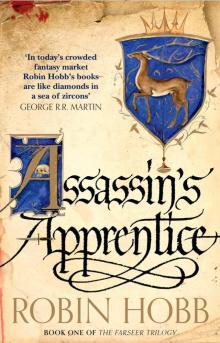 Assassins Apprentice
Assassins Apprentice The Dragon Keeper
The Dragon Keeper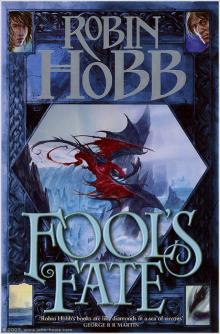 Fools Fate
Fools Fate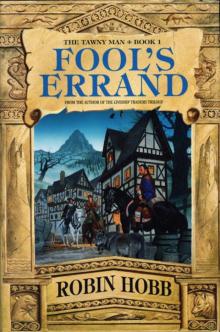 Fools Errand
Fools Errand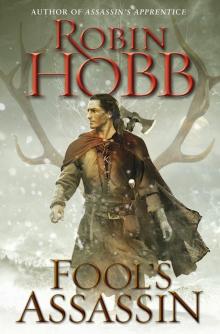 Fools Assassin
Fools Assassin The Mad Ship
The Mad Ship Shamans Crossing
Shamans Crossing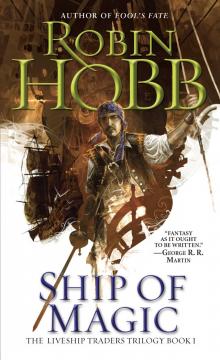 Ship of Magic
Ship of Magic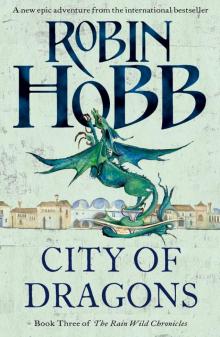 City of Dragons
City of Dragons Dragon Haven
Dragon Haven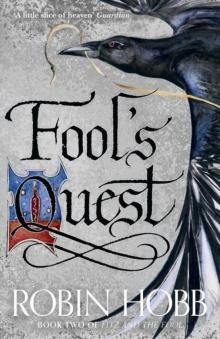 Fools Quest
Fools Quest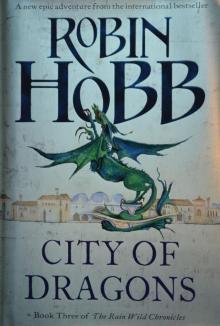 Blood of Dragons
Blood of Dragons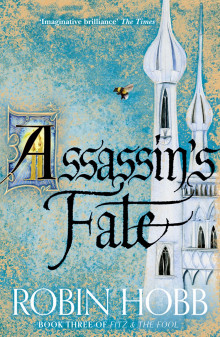 Assassin's Fate
Assassin's Fate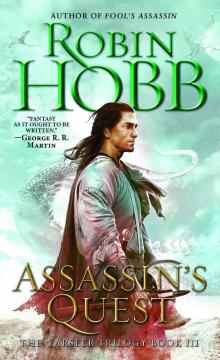 Assassins Quest
Assassins Quest Renegades Magic
Renegades Magic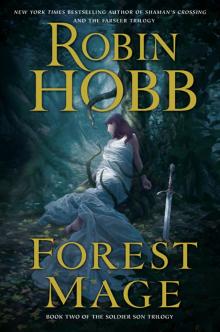 Forest Mage
Forest Mage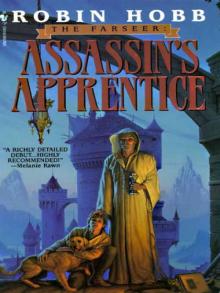 Assassin's Apprentice tft-1
Assassin's Apprentice tft-1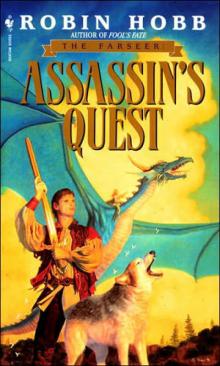 Assassin's Quest tft-3
Assassin's Quest tft-3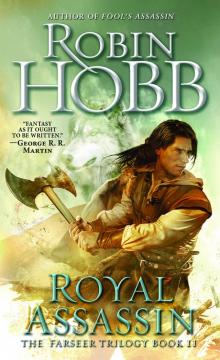 Royal Assassin
Royal Assassin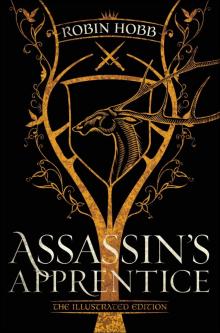 Assassin's Apprentice (The Illustrated Edition)
Assassin's Apprentice (The Illustrated Edition) Assassin's Quest (UK)
Assassin's Quest (UK) Royal Assassin (UK)
Royal Assassin (UK)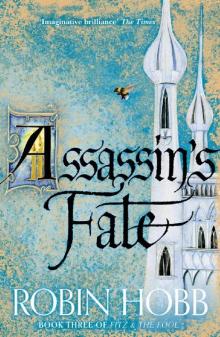 FF3 Assassin’s Fate
FF3 Assassin’s Fate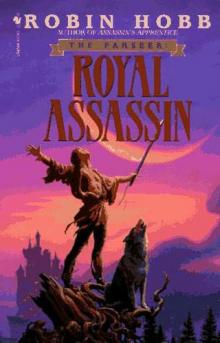 Royal Assassin tft-2
Royal Assassin tft-2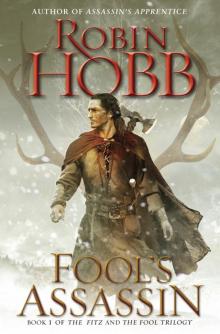 Fool’s Assassin: Book One of the Fitz and the Fool Trilogy
Fool’s Assassin: Book One of the Fitz and the Fool Trilogy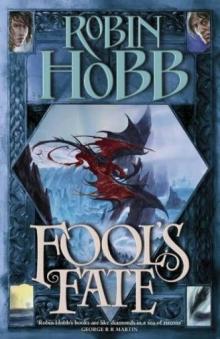 Fool's Fate ttm-3
Fool's Fate ttm-3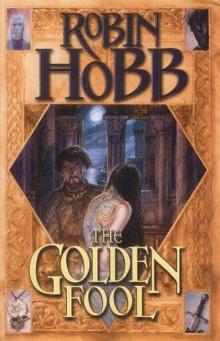 The Golden Fool ttm-2
The Golden Fool ttm-2 The Liveship Traders Series
The Liveship Traders Series The Wilful Princess and the Piebald Prince
The Wilful Princess and the Piebald Prince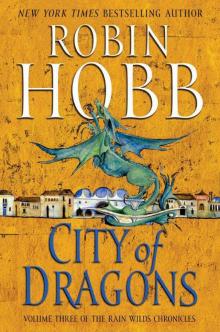 City of Dragons rwc-3
City of Dragons rwc-3 The Tawny Man 1 - Fool's Errand
The Tawny Man 1 - Fool's Errand Words Like Coins
Words Like Coins The Complete Tawny Man Trilogy Omnibus
The Complete Tawny Man Trilogy Omnibus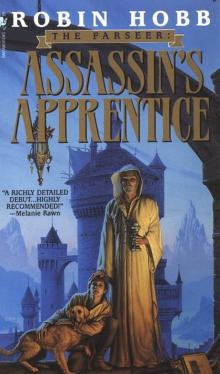 Farseer 1 - Assassin's Apprentice
Farseer 1 - Assassin's Apprentice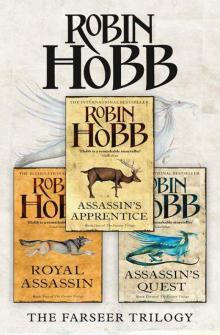 The Complete Farseer Trilogy Omnibus
The Complete Farseer Trilogy Omnibus The Soldier Son Trilogy Bundle
The Soldier Son Trilogy Bundle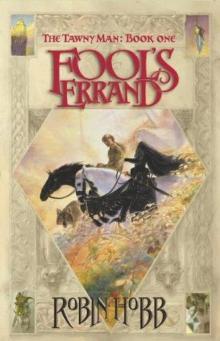 Fool's Errand ttm-1
Fool's Errand ttm-1 Blue Boots
Blue Boots Shaman's Crossing ss-1
Shaman's Crossing ss-1 Mad Ship
Mad Ship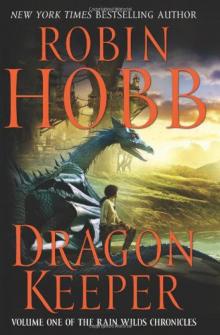 Dragon Keeper
Dragon Keeper The Willful Princess and the Piebald Prince
The Willful Princess and the Piebald Prince Ship of Destiny tlt-3
Ship of Destiny tlt-3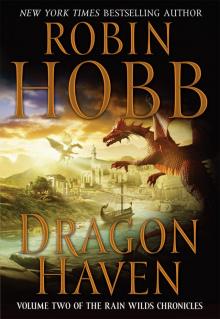 Rain Wild Chronicles 02 - Dragon Haven
Rain Wild Chronicles 02 - Dragon Haven The Dragon Keeper trwc-1
The Dragon Keeper trwc-1 The Triumph
The Triumph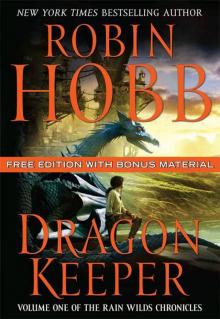 Dragon Keeper Free Edition with Bonus Material
Dragon Keeper Free Edition with Bonus Material Mad Ship tlt-2
Mad Ship tlt-2 The Inheritance and Other Stories
The Inheritance and Other Stories Tawny Man 02 - Golden Fool
Tawny Man 02 - Golden Fool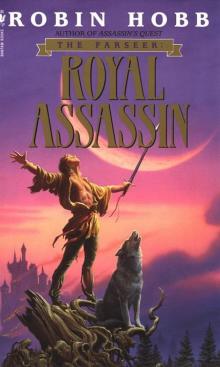 Farseer 2 - Royal Assassin
Farseer 2 - Royal Assassin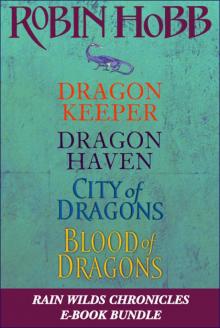 Rain Wilds Chronicles
Rain Wilds Chronicles Forest Mage ss-2
Forest Mage ss-2 Ship of Magic lt-1
Ship of Magic lt-1 Renegade's Magic ss-3
Renegade's Magic ss-3